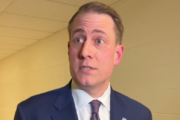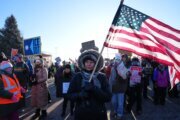HONG KONG — On a recent gray spring day, Joshua Wong took a break from the scrum of interviews he was granting by sheltering in Citic Tower, the downtown office building that overlooks the vast reclamation works taking place along this city’s harbor front.
Wong’s role as one of the student leaders of the 2014 “Umbrella Movement,” sit-in demonstrations that unsuccessfully demanded greater public participation in the election of the city’s top public official, has earned him the role of international poster boy for democracy in Hong Kong. As this weekend’s election approaches for the chief executive, Hong Kong’s top government position, news media are interested in Wong’s views.
Wong was born just a year before the United Kingdom returned Hong Kong to Chinese rule and theoretically should identify with a greater China more so than his parents and grandparents. But like so many in his generation who have grown up in Hong Kong, Wong sees himself different from the mainland Chinese, and this burgeoning sense of identity has Beijing rattled.
“We’re the generation being blacklisted by China,” Wong says, accusing the central government in Beijing of fueling local resentment by punishing the participants of the 2014 protests. “Even those who only gave out water … gave out leaflets [during the 2014 pro-democracy protests] were all banned from entering China. So, how can we get a sense of belonging to China?”
The March 26 election for Hong Kong’s chief executive is more than a vote on who will lead the territory’s government. The election is placing a focus on Hong Kong’s youth and young adults, who increasingly believe their futures are being shortchanged by a system they fear is rigged in favor of mainland Chinese.
This year marks the 20-year anniversary of the British handover and Beijing’s promise of preserving the “One country, two systems” model of governance for Hong Kong, where the laws and courts drawn up during the British colonial era remain intact. This year also was supposed to be the year that Hong Kong voters could directly elect the chief executive, a promise Beijing made in 2007, and then reneged on in 2014 — a move that triggered the Umbrella Movement protests.
“The promise [of democracy] has always been there, the expectation was always there,” says Jasper Tsang, founding chairman of the Democratic Alliance for the Betterment of Hong Kong, a political party largely seen to be pro-Beijing.
Hong Kong remains an open society compared to mainland China. Freedom of speech is guaranteed, and internet regulation is much looser. As Chinese President Xi Jinping cracks down on dissent, however, many in Hong Kong worry about an erosion of civil liberties in the territory.
The election for chief executive officially has three contenders, but the voting system is stacked in favor of business and government interests that are openly pro-Beijing. In a city of more than 3.7 million registered voters, ballots for the chief executive are cast by 1,194 members of an election committee, themselves chosen by roughly a quarter of a million people. Carrie Lam, the candidate Beijing is viewed to support, is expected to draw almost 600 of the committee member’s votes.
Wong’s views about identity represent a sharp, recent change. It’s only in recent years that surveys have shown a large segment of Hong Kong residents identifying as being purely from Hong Kong. It’s a trend that began in late 2008, after the height of unity felt during and in the lead up to the Beijing Olympics, according to polling by the University of Hong Kong.
Rising inequality across the territory also is fueling the increasing local self-identification, says Shirley Lin, a professor at the Chinese University of Hong Kong. She traces the roots of this identity crisis to 2003, when the Hong Kong government became reliant on measures from Beijing to solve the economic crisis spurred by the deadly outbreak Severe Acute Respiratory Syndrome, or SARS.
Those measures encouraged greater integration between the territory and the mainland and included allowing more tourists and immigration from the mainland into Hong Kong. It also meant Hong Kong businesses became reliant on mainland China, shaking the foundation of one-country two-systems.
“Our economy is totally hijacked by the Chinese businesses, but you have to realize that most of it is [Chinese] government-owned,” says Lin, who is a former Goldman Sachs executive. “I’m not talking about private businesses that are running the stock market here. We have to curry favor in order to get more companies to list here.”
Hong Kong firms once dominated the real-estate market. In the past year, however, 53 percent of government land sales went to mainland Chinese firms, up from just 1 percent in 2011, according to Bloomberg.
Further fueling a local protectionist attitude is China’s focus on using economic incentives to reward those that behave “well” and to punish those that don’t, Lin says. The practice fuels a sense of marginalization and widening divide between rich and poor in the city.
Other issues confronting Hong Kong are homegrown. The territory’s education system is a microcosm of the city’s inequality problem. Most of the top schools are private and expensive, costing more than that of a college education. Education is increasingly out of reach for most families in a city where the median household monthly income is about $3,000. Affordable quality public schools exist, but they are diminishing, as the government pulls subsidies from semi-private schools once favored by the British government.
“Most public officials’ kids study abroad, so why would they care about Hong Kong?” Wong says. “It proves they have less faith or trust in the education system.”
Trust between Hong Kong residents and Beijing is shaky, at best. In the eyes of Hong Kong residents, the central government keeps changing the rules, such as delaying a date for direct elections. In the eyes of the leaders in Beijing, Hong Kong residents refuse to be patriots.
In 2003, Beijing lost faith in the Hong Kong’s leadership’s ability to keep a grip on the populace. The Hong Kong government’s failure to pass national security legislation due to strong public opposition, the subsequent failure to pass national education legislation in 2012 and then the pro-democracy protests in 2014 led Beijing to worry that Hong Kong was moving away from the motherland.
“It’s a vicious cycle,” says Tsang, of the Democratic Alliance political party. The more Beijing tightens its grip on Hong Kong, the more Hong Kong people want more autonomy.
Tsang says Hong Kong residents and Beijing have fundamentally different views on governance. Beijing and his party hardliners, Tsang says, want a judge who always rules in favor of the Communist Party, a media that isn’t critical and opposition not supported by the people.
“But take these away, and it’s not Hong Kong.”
More from U.S. News
Beijing Tightens Its Control Across China
In Hong Kong, a Model for Aging with Grace
What Abandoned Ships Say About the Global Economy
Hong Kong Elections Approach Amid Growing Local Anxiety originally appeared on usnews.com







